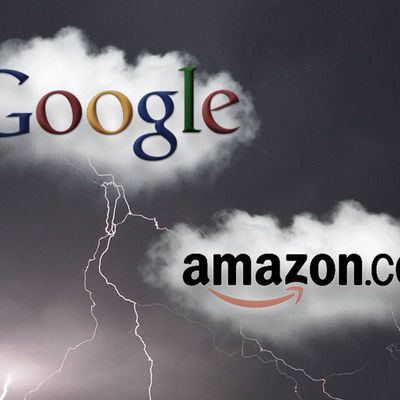
The Amazon Web Services Summit, held at the Moscone Center in San Francisco last week, hardly registered as an epochal event in tech history. On the surface, it looked like any other enterprise tech conference – a few thousand programmers and salespeople, mostly male and 30-something, a few with ponytails, wearing t-shirts and name badges and lanyards. The booths were numerous; the boxed lunches were plentiful; the jargon was thick.
“Instantly create dev & test environments for your complex VMWare based enterprise applications,” one sign read.
What wasn’t immediately apparent, watching the throng of coders milling around to various panels and breakout sessions, was that Amazon Web Services is engaged in the fight of its life – a war whose outcome will mean a lot to everyone who uses the internet.
You may never have heard of Amazon Web Services. But if you’ve ever watched a streaming movie on Netflix, clicked on a BuzzFeed list, booked an Airbnb rental, listened to a Spotify song, or browsed a Pinterest board, you’ve used it. AWS, as the division of Amazon is known, is a cloud-computing juggernaut that sells low-cost data storage and processing power to companies around the world – from Fortune 500 staples like Unilever and GE to government agencies like the CIA and the U.S. Navy – typically for a fraction of what it would cost them to build their own server farms.
Those savings are part of why AWS has grown to host a shockingly large percentage of the internet – it’s been estimated that a third of internet users click on an AWS-hosted site every day. It’s also why AWS has become big business – it generated an estimated $3.2 billion in revenue last year – and why some analysts expect it to one day become even bigger than Amazon’s core retail division.
Since AWS was started in 2006, it’s had a near-monopoly on large-scale cloud computing. (A 2013 report estimated that AWS controlled five times the computing power of the next 14 largest cloud providers combined.) But Google is intent on catching up. Google’s cloud platform started in 2008, but was only made generally available to non-Google customers last year. So far, it hosts data for start-ups like Snapchat and Khan Academy, and while its outside user base is still much smaller than AWS’s, Google’s enormous infrastructure – the massive data centers the company has built all over the world to host its core search engine, as well as products like Gmail and Google Drive – make it a formidable competitor. “It has become clear that the public cloud is the way of the future,” Urs Hölzle, the head of Google’s cloud business, recently told Wired.
The day before the AWS conference, Google announced that it was slashing prices on its cloud services by as much as 85 percent, making them among the cheapest on the market. Amazon retaliated by announcing that its prices, too, would be cut – by between 30 and 61 percent, depending on the specific service.
“Lowering prices is not new for us,” said AWS head Andy Jassy, in a thinly veiled jab at Google. “Whenever we can take costs out of our own cost structure, we will give them back to our customers in the form of lower prices.”
Price wars are a staple of the tech industry. These days, you can see them everywhere you look – Uber and Lyft competing for the low-cost car-service business, Postmates and Google Shopping Express competing for same-day delivery, T-Mobile stealing market share from Verizon and AT&T with low-price promotions. Amazon, of course, is the ruthless maestro of internet price aggression – its entire existence, in fact, is owed to its willingness to shrink its profit margins to nearly nothing in order to crush its competitors.
But the battle between Amazon and Google over cloud computing has much bigger stakes than, say, the competition between Amazon and Barnes & Noble over book sales. Whoever wins the cloud war will, in effect, control the internet. As the back-end operator of the world’s biggest companies, the choices the winner makes will have a major impact on issues like net neutrality and data privacy. In the web of the future, the cloud operators will be be the virtual landlords, controlling who’s allowed to build what where – and for how much.
Amazon is still firmly in the lead. In addition to a multi-year head start, AWS also has the advantage of having become dominant enough that an entire layer of software has been built on top of it – third-party add-ons that give AWS customers new ways to perform complicated data analysis, safeguard their virtual servers, and speed up their operations. AWS also has inroads into government that Google and other competitors lack, like a huge CIA contract for a private cloud, and a recent authorization it received from the Department of Defense, which enables it to build cloud services that meet the agency’s strict security criteria.

Amazon is no stranger to losing money on purpose. (At this point, Wall Street is disappointed when the company does post a profit.) When I asked Matt Wood, the chief data scientist at AWS, what he thought of Google’s price cuts, he told me that “price drops are part of the pulse of [Amazon’s] organization.” Wood continued: “One thing we share with our cousins over at Amazon.com is that we’ve always known that cloud computing was a high-volume, low-margin business. We’re very, very comfortable with it.” AWS’s aggressive pricing moves aren’t likely to raise concerns among investors, even if they result in large short-term losses. But Google knows how to play the market-share game, too – it famously gave away Android in order to loosen iOS’s stranglehold on the mobile device market and provide more traffic to its search engine.
AWS may have to be comfortable losing money for a while. As companies like Box have found out, it’s expensive to get customers in the cloud-computing business, and it’s even more expensive when a rival is threatening to undercut you every day. I asked Wood if he thought cloud computing costs would ever fall to zero as the result of a race-to-the-bottom with Google.
“Never say never,” he said.
Of course, the real winner of the cloud pricing wars will be the consumer. At the AWS conference, I met several business executives who were giddy about the back-and-forth price cuts by Amazon and Google, which have reduced many of their monthly cloud-storage bills by more than half.
“Yesterday was the first time for me that, as a long-time customer, it was finally real,” said one AWS customer, Librato CTO Joe Ruscio. ” I have a real choice now. It’s happening!”
My preference, given the choice between Amazon and Google, would be for an Amazon-dominated cloud. After all, while Google has a history of giving away free services like Gmail and Google Drive, it also has a history of monetizing those services by selling ads against the information passing through them. And Amazon’s track record on privacy and encryption is better than that of most internet giants – a huge competitive advantage in a market that’s all about trust. Will Unilever really want to give its sensitive information to a company that couldn’t keep its data centers away from the NSA?
Perhaps the best thing about an Amazon victory though, would be that – as with its retail business – the company’s investors wouldn’t necessarily expect it to turn a profit on the cloud. As long as new customers were moving their local operations to the AWS cloud, and as long as revenue continued to climb, there’s no reason to suspect that Amazon would ever need to raise prices on AWS, or turn the fabled “profit switch” that pundits have been speculating about for years. In other words, Amazon CEO Jeff Bezos’s ruthless obsession with cost-cutting and customer satisfaction might one day mean that cloud computing becomes something like water or electricity – a basic utility, reliable and cheap, omnipresent yet nearly invisible – with Amazon’s legendarily patient investors footing the bill.





























